Key takeaways:
- Understand crucial components of venue contracts, including rental fees, payment schedules, and liability clauses.
- Prepare for negotiations by defining non-negotiables, researching the venue, and employing active listening for win-win solutions.
- Build relationships with venue managers to enhance negotiating power and facilitate collaborative discussions.
- Emphasize clarity and flexibility when finalizing contract terms, ensuring a thorough review of all details before signing.
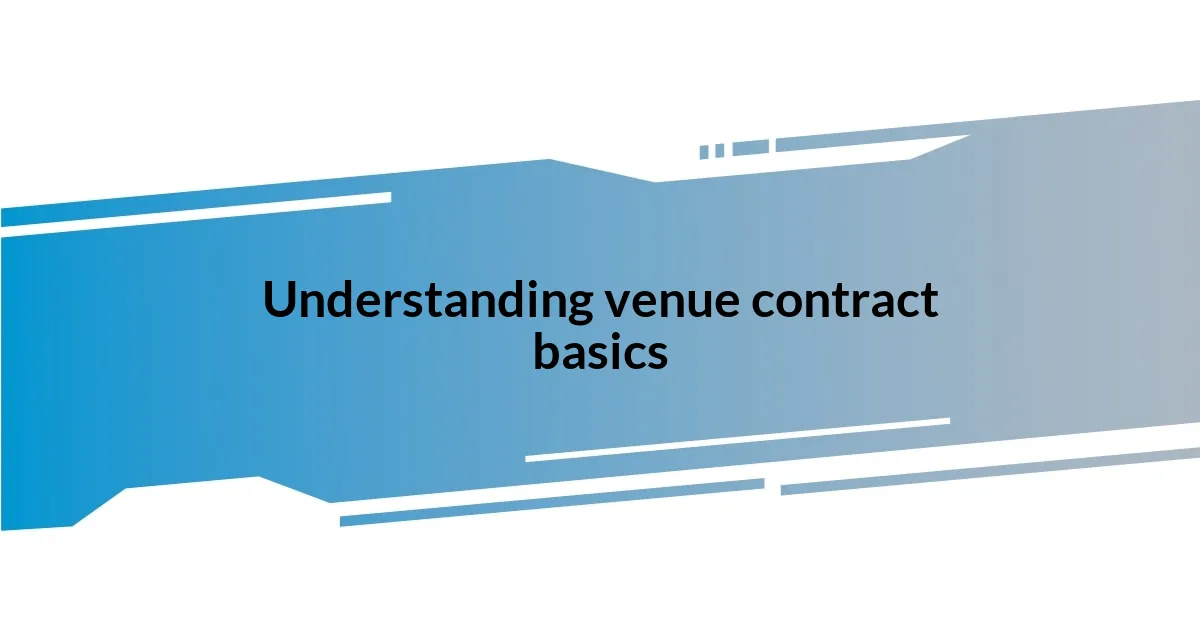
Understanding venue contract basics
When delving into venue contracts, it’s essential to understand the fundamental components, such as rental fees, payment schedules, and cancellation policies. I remember the first time I skimmed through one, thinking it was just a formality, only to discover hidden fees that nearly derailed my budget. Have you ever overlooked a detail in a contract that came back to bite you later?
Beyond the obvious terms, I find it crucial to grasp the specific clauses that protect both parties. For instance, liability clauses are often buried in the fine print, yet they dictate who’s responsible if something goes wrong. I learned this the hard way after an unexpected storm disrupted an outdoor event; knowing what the venue’s liability was gave me peace of mind and clarity in handling the aftermath.
Finally, it’s all about the negotiation—the art of framing your needs in a way that the venue can accommodate. I vividly recall negotiating for additional hours because the event ran long; the venue manager appreciated my proactive discussion, and it fostered a collaborative spirit. Have you considered how your approach could change the tone of the entire negotiation?
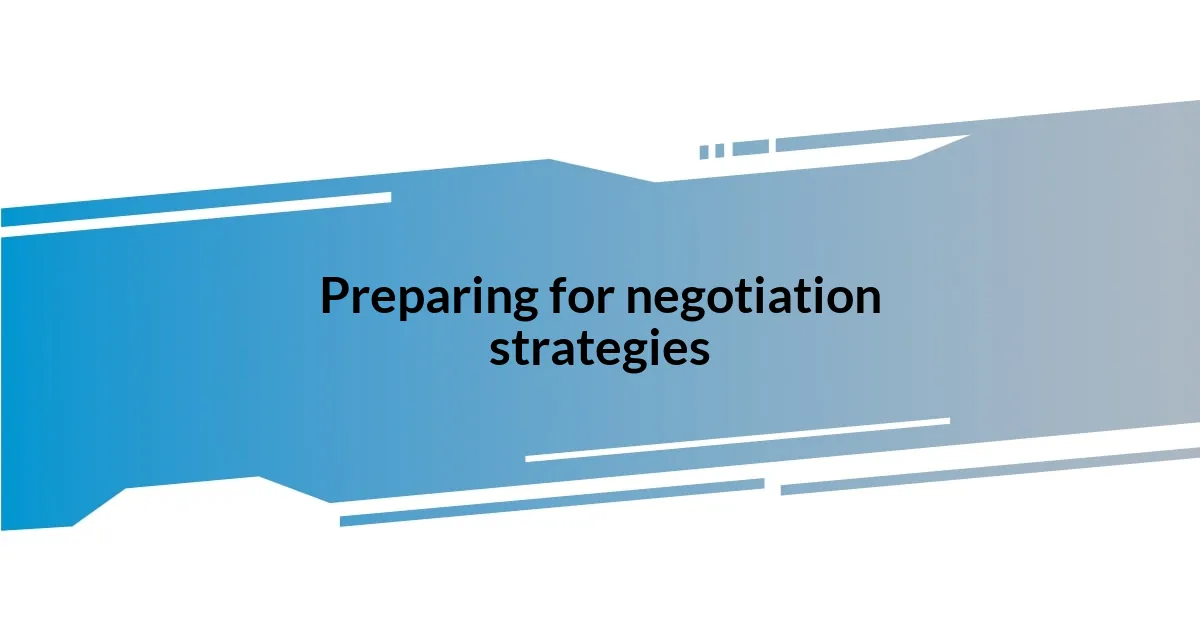
Preparing for negotiation strategies
Preparing for negotiation strategies requires a deliberate approach that balances preparation with flexibility. I’ve learned that coming to the table with clear objectives is essential, but being adaptable can often lead to unexpected benefits. For example, when I aimed to extend the length of my event, I quickly realized that offering more insight into my goals made the venue more willing to negotiate additional hours—this approach not only addressed my needs but also fostered a relationship based on mutual understanding.
Here are some key strategies I recommend for effective negotiation preparation:
- Define Your Non-Negotiables: Identify the aspects of the contract that you absolutely cannot compromise on.
- Research the Venue: Know their strengths and weaknesses, including peak seasons and typical client profiles.
- Have a Backup Plan: Consider alternatives in case negotiations don’t work out as anticipated.
- Outline Your Goals: Be specific about what you need and how it aligns with the venue’s interests.
- Practice Active Listening: Be prepared to listen to the venue’s pain points and find win-win solutions.
Reflecting on these strategies helped me tremendously when I was faced with a rigid venue manager. By focusing on their priorities and showing how accommodating my requests could benefit them as well, I turned a potential deadlock into a productive dialogue.
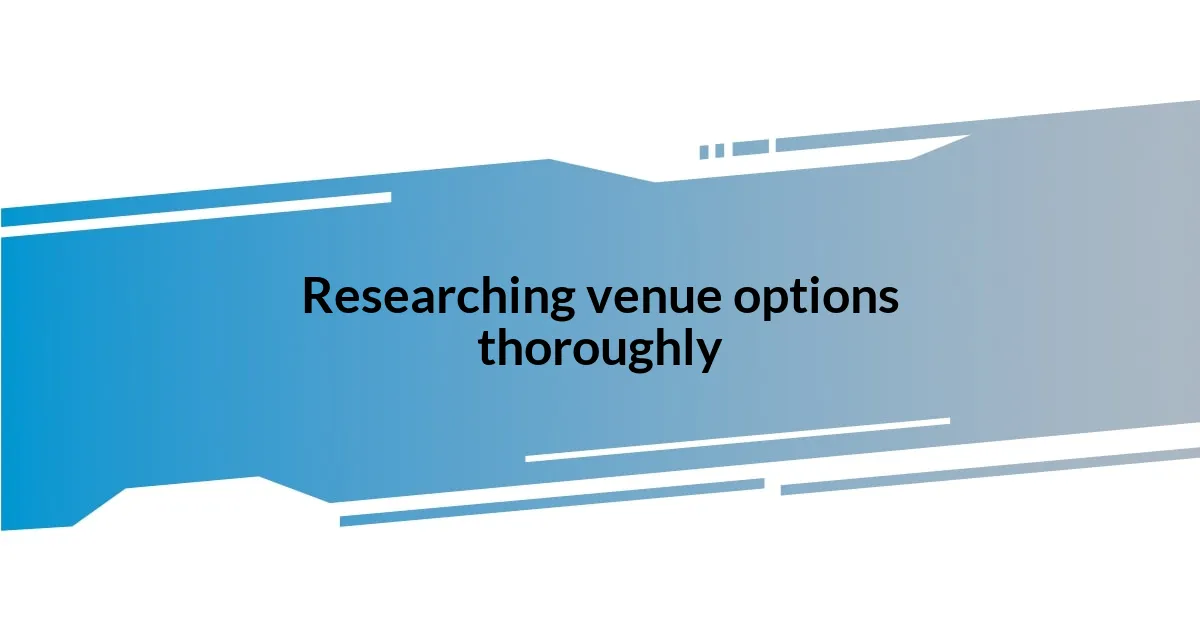
Researching venue options thoroughly
Researching venue options thoroughly is a critical step that can shape the success of your event. I remember spending countless hours diving into online resources, reading reviews, and even visiting different locations before making a decision. It felt overwhelming at times, but that effort paid off when I stumbled upon a hidden gem that perfectly matched my vision and budget. Have you ever discovered an unexpected venue that exceeded your expectations?
When exploring options, I find it useful to leverage comparative tools like spreadsheets or tables. Keeping track of each venue’s pros and cons can clarify what best suits your needs. For instance, some venues offer additional services, such as catering or decorations, which I found beneficial and could save time and money. On the other hand, certain locations may have restrictions that could pose challenges, something I only realized after a second look at their conditions. How do you keep track of your venue options during research?
I also believe that visiting potential venues in person provides invaluable insight. One time, I walked into a venue that looked stunning in photos, but I quickly noticed it had poor acoustics and not enough natural light, which could have impacted the atmosphere significantly. It’s true what they say: seeing is believing. Getting a feel for the space can help you envision how your event will unfold. Plus, engaging directly with the venue staff often reveals their willingness to accommodate your requests, which can make all the difference in your planning.
| Venue Name | Key Features |
|---|---|
| Riverfront Hall | Scenic views, outdoor space, catering included |
| Grand Ballroom | High ceilings, good sound system, limited parking |
| City Rooftop | Stunning skyline, great for evening events, weather dependent |
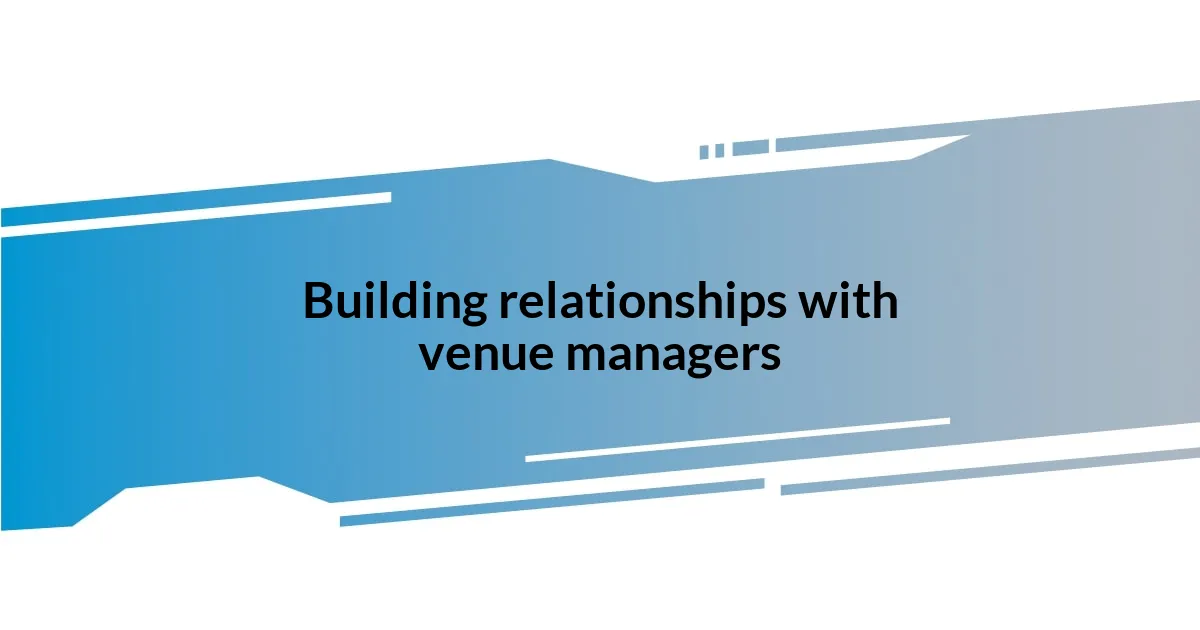
Building relationships with venue managers
Building strong relationships with venue managers can significantly enhance your negotiating power. I recall a time when I made an earnest effort to connect with a venue manager beyond transactional discussions. During our initial meeting, I took the time to understand their preferences, past experiences, and challenges. This not only helped me tailor my requests more effectively but also established a sense of trust that I believe was invaluable during the contract negotiations. Have you ever taken time to really get to know someone involved in a deal, and noticed how it changed the dynamics?
When I approached venue managers with transparency and genuine curiosity, I could sense a shift in our interactions. For instance, there was one occasion where a manager shared their concern about accommodating a last-minute request from another client. Instead of pressing further, I offered solutions that would relieve their burden, showing them I cared about their concerns too. This exchange fostered a collaborative spirit—it became clear that we were both invested in creating a successful event.
It’s essential to approach these relationships with the mindset that you are partners in this endeavor. I often reflect on how a strong rapport allowed me to ask for favors that would typically seem unreasonable, like a longer booking time at a peak hour. Instead of a flat “no,” I would receive thoughtful consideration and, more often than not, a favorable response. Building connections like these doesn’t happen overnight, but every conversation is a stepping stone toward creating a network of support that benefits both parties. Wouldn’t you agree that strong relationships can transform challenging negotiations into seamless collaborations?
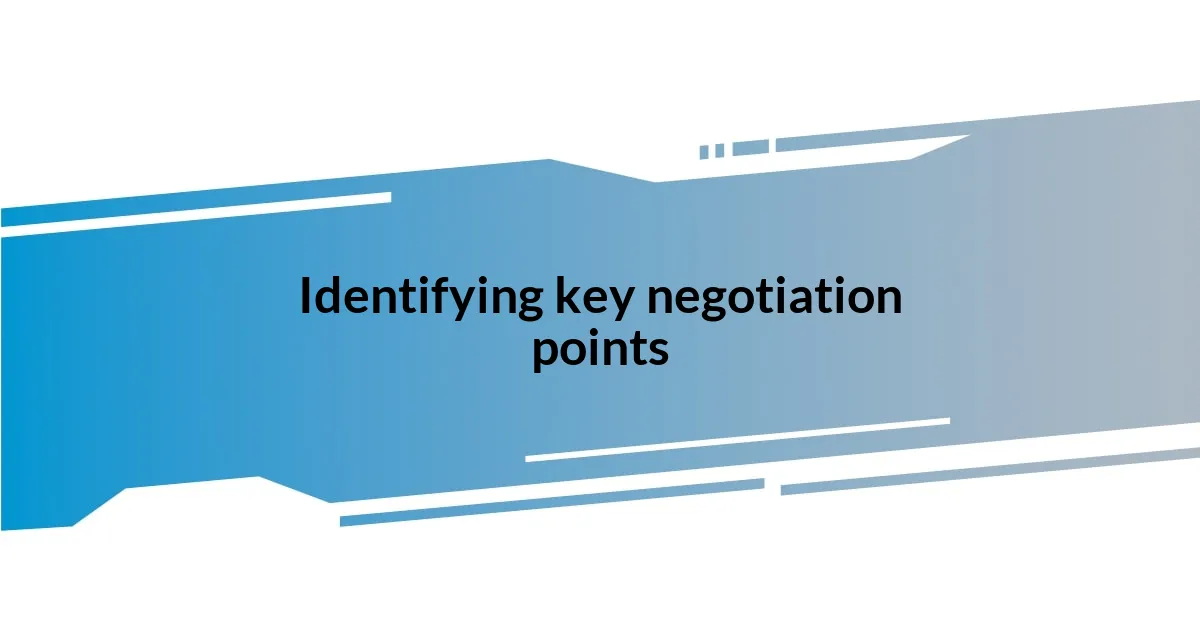
Identifying key negotiation points
Identifying key negotiation points requires a clear understanding of your priorities. I often start by listing what I absolutely need versus what I would like to have. For example, during one negotiation, I realized that securing a flexible cancellation policy was critical for my event’s success. When I openly communicated this with the venue, it led to a productive discussion about options that ultimately worked in our favor. Have you ever pinpointed a deal-breaker that shifted the direction of your negotiations?
Another vital area to examine is the venue’s pricing structure. I remember a time when I discovered hidden fees buried in the fine print, like charges for setup and breakdown services. By addressing these aspects upfront, I was able to negotiate a more transparent agreement. It was eye-opening to learn that asking about these fees could lead to a reduction or even their complete removal in some instances. How proactive are you when it comes to clarifying costs in a contract?
Lastly, I often focus on logistics and operational details. For instance, I made it a point to discuss the availability of in-house tech support during an event I hosted. I found that having on-site assistance was a crucial bargaining chip. It not only eased my stress but also ensured that any last-minute adjustments could be handled seamlessly. Reflecting on my experiences, I can’t stress enough how dissecting logistics can provide leverage in negotiations. Have you considered how operational details can add value to your contracts?
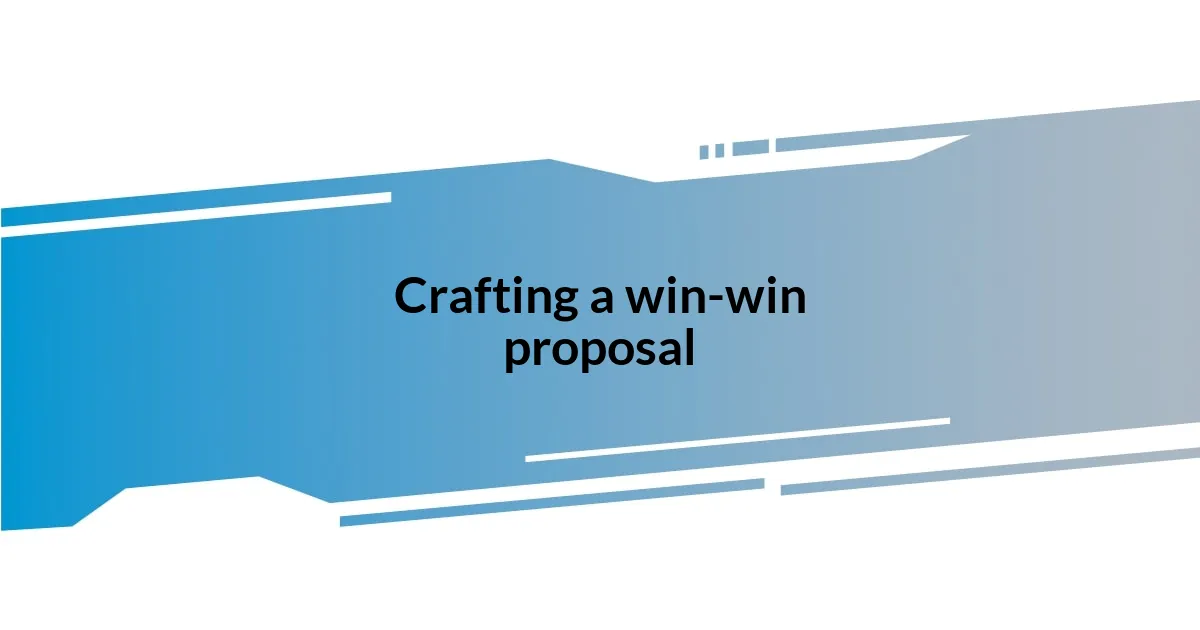
Crafting a win-win proposal
Crafting a win-win proposal means aligning your objectives with those of the venue. I remember putting together a proposal for a large corporate event, where my priority was setting a reasonable budget while still providing an exceptional experience. Instead of just listing our needs, I highlighted how the venue would benefit from our choice—like promising to share testimonials that could attract future clients. Have you ever thought about how your needs might also serve the interests of the other party?
One tactic I’ve found effective is offering something of value in exchange for something I need. In a negotiation for a wedding venue, I noticed they were interested in promoting their space on social media. I proposed showcasing their venue in return for a reduced rental fee, emphasizing how that exposure could bring them more clients. This simple shift in perspective made the negotiation feel collaborative rather than confrontational. Just think for a moment: how can you leverage your strengths to create mutual benefits?
Finally, I’ve learned that clarity is key in any proposal. One time, I drafted a contract with detailed terms that included not just the costs but also the expected roles and responsibilities for both parties. I shared this draft with the venue manager before our final meeting, ensuring we were aligned on everything. This transparency not only helped avoid misunderstandings later but also fostered an atmosphere of trust. Have you ever laid out expectations clearly, and noticed how it changes the conversation? Clarity can transform a negotiation from mere transactional exchanges to partnership discussions.
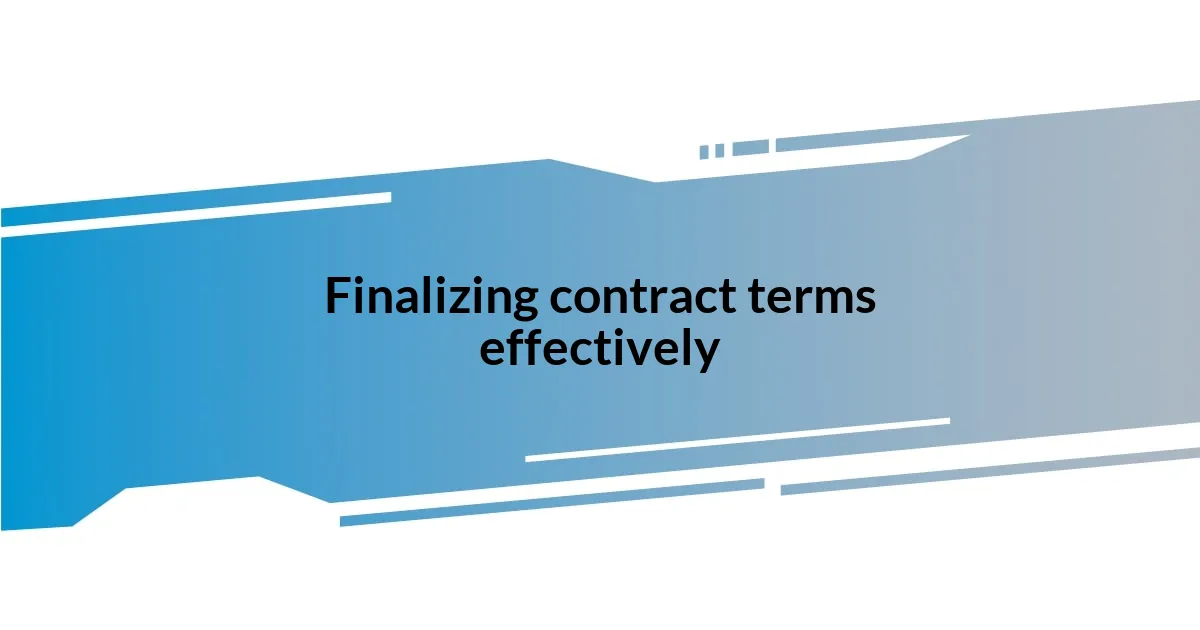
Finalizing contract terms effectively
Reaching a consensus on contract terms demands both clarity and flexibility. I recall a pivotal moment during a negotiation when I realized I needed to prioritize my terms clearly but remain open to the venue’s suggestions. It was like walking a tightrope: I had to assert my needs while respecting their constraints. This approach not only facilitated smoother conversations but also built rapport with the venue management. Have you ever found your ability to adapt shaping the outcome of a negotiation?
It’s also essential to double-check all terms before signing. On one occasion, I missed a small clause regarding additional costs related to catering, which later surprised me and affected my budgeting. Taking the time to thoroughly review each detail empowers you in the long run. How diligent are you in scrutinizing the fine print to safeguard your interests?
Finally, I’ve discovered that a face-to-face meeting can be invaluable for finalizing contract terms. During one of my events, a casual coffee meeting with the venue coordinator allowed us to iron out the details more effectively than over emails. The personal interaction paved the way for open discussion, and I felt both parties could express concerns in a relaxed atmosphere. In your experience, do you think personal connections can help foster better agreements?